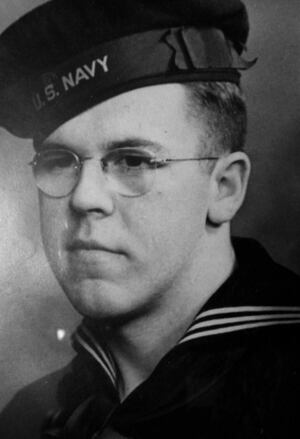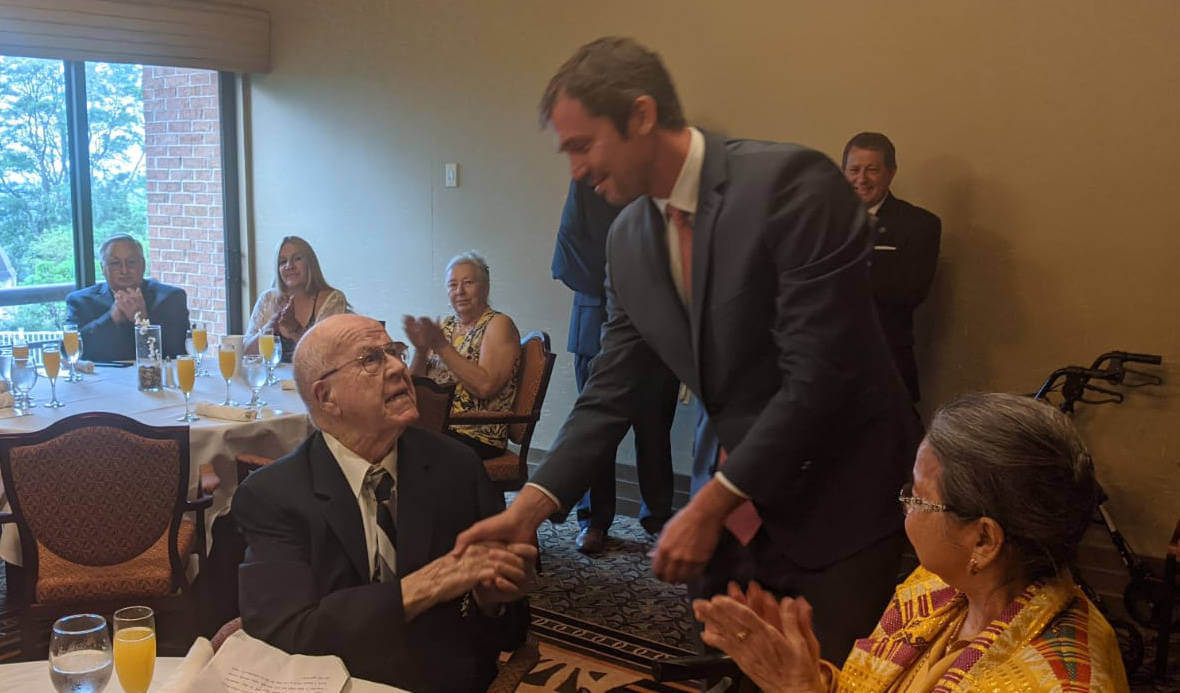Eugene D. Dollard was a Notre Dame freshman, just 18 years old, when he left school to answer the call of his country.
It was 1943 and the United States was immersed in World War II, battling the Nazis in Europe and the forces of totalitarianism around the globe. Dollard would serve in the U.S. Navy in Europe, in the Mediterranean and the Pacific — and witness more death and brutality than most men experience in a lifetime.

Dollard ’49, of Hamlin, New York, is now 96. On June 9, he was awarded France’s Legion of Honor at a ceremony in Fairpoint, New York.
“I’m one of the fortune ones,” says Dollard, who was touched by the ceremony. It brought back memories of many friends and military comrades, some of whom gave their lives in the war and others who have died in the years since.
He received the insignia of Chevalier dans l’Ordre National de la Légion d’Honneur — a Knight in the National Order of the Legion of Honor. It was presented by Jérémie Robert, France’s Consul General in New York.
The Legion of Honor is France’s highest order of merit, established in 1802 by Napoleon Bonaparte. While membership is typically restricted to French citizens, foreign nationals who have served France may receive the honor.
In 2004, which marked the 60th anniversary of the D-Day invasion, French President Jacques Chirac decided to honor American World War II veterans who fought on French soil during that war. Several hundred U.S. veterans have so far received the Legion of Honor for their service.
“France sees the great importance and significance of what was accomplished through our alliance with the United States during WWII. We feel it is essential to thank all the great heroes who helped liberate our soil from the terrors of Nazism and who helped secure our freedom, democracy, values and way of life while there is still time,” says a written statement from the French Consul’s office.
Dollard was just 17 when he arrived at Notre Dame. He moved into Zahm Hall and started classes. But the nation was gearing up its war operation.
Many students had already left to join the U.S. military. Military service and training have long been a part of the Notre Dame tradition. In April 1942, much of the campus became a military camp with establishment of the naval V-7 Program to train Navy officers. About 12,000 officers were trained during the war years, while only a few hundred civilian students remained.

After one semester, Dollard left to enlist in the U.S. Navy. After three months of training, including gunnery school, he was assigned to the U.S. Naval Amphibious Division. His unit departed from Hoboken, New Jersey, on the newly commissioned U.S.S. Henrico, sailing to Great Britain.
Dollard participated in the D-Day invasion of Normandy on June 6, 1944, the largest seaborne invasion in history. The operation began the liberation of France and eventually all of western Europe, leading to the Allied victory on the Western Front.
“We took in the initial wave at Normandy,” Dollard recalls in a telephone interview. His ship transported part of General Dwight D. Eisenhower’s 1st Division in the initial wave on Omaha Beach, providing support for the landing forces. He manned 20-millimeter machine guns and oversaw small landing craft — Higgins boats — used for the amphibious landings.
“It was wholesale slaughter where 7,000 men were killed in the first 24 hours,” Dollard recalls in a written history of his military experiences by his daughter, Elizabeth Bysiek.
After Normandy, Dollard was sent to North Africa, including Morocco and Algeria. He recalls riding across the Algerian mountains on horses the Allied troops found that had Nazi swastikas branded into the animals’ flanks.
Later, in Naples, Italy, his unit picked up General George S. Patton’s 3rd Army, delivering the troops to St. Tropez, and then went on to Marseille for Operation Dragoon, the August 14, 1944, Allied invasion of southern France. He witnessed a tank battle on the steps of the Marseille Cathedral.
Dollard then was transferred to the U.S.S. Chilton to serve in the Pacific. In June 1945, while fighting Japanese during the Battle of Okinawa, he faced the greatest carnage of the war. The ship was struck by a kamikaze aircraft and Dollard was wounded, but soon recovered.
His unit was preparing for the Allied invasion of Japan, which never happened. “Thank the Lord Harry Truman was president, or I wouldn’t be here,” he says. “I had a lot of close calls.” The Japanese surrendered in early September 1945.
Shortly thereafter, Dollard was honorably discharged. He returned to the United States, re-enrolled at Notre Dame and graduated with a bachelor’s of science degree in commerce. He briefly attended Notre Dame Law School, but decided study of the law was not for him.
Dollard returned home to upstate New York to lead the family business, a diversified firm that includes wholesale and retail meat, a liquor store, and real estate that he’s now been running for 74 years. He married and raised a family.
The elderly veteran is one of the shrinking pool of Americans from the Greatest Generation, those born in the first quarter of the 20th century whose lives were shaped by the Depression and service in World War II. Of the more than 16 million Americans who served in the military during that war, fewer than 300,000 are still living, according to a 2020 Pew Research report.
About 150 members of Notre Dame’s Class of 1949 are still living, according to Notre Dame Alumni Association records.
Dollard’s older brother also graduated from Notre Dame. Vincent Dollard ’39, died in May 2020 at age 102.
Dollard says he hopes today’s young adults never have to encounter the dangers that faced the world and young men like himself during World War II.
Margaret Fosmoe is an associate editor of this magazine.